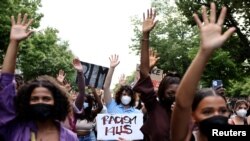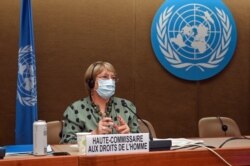U.N. human rights chief Michelle Bachelet is calling for action and concrete measures to end systemic racism and racial violence against Africans and people of African descent. The high commissioner has presented a series of recommendations to address existing problems in a report to the U.N. Human Rights Council.
The report was mandated by the Council a year ago in the aftermath of the killing of African American George Floyd while in police custody in Minneapolis, in the U.S. state of Minnesota.
Bachelet called Floyd’s murder a tipping point. She said it has shifted the world’s attention to the human rights violations routinely endured by Africans and people of African descent.
The report provides a comprehensive view of the inequalities, marginalization, and lack of opportunities that render many people of African descent powerless, trapped in poverty and victimized by a system of social injustice.
The report focuses on lethal incidents at the hands of law enforcement. Bachelet says her office has received information about at least such 190 deaths of Africans and people of African descent. She notes 98% have occurred in Europe, Latin America, and North America.
She said there has been a strikingly consistent failure to see justice done in all these cases.
“Three key contexts in which police-related fatalities stood out: The policing of minor offenses, traffic stops and stop-and-searches; the intervention of law enforcement officials as first responders in mental health crises; and special police operations in the context of the 'war on drugs' or gang-related operations.… Moreover, law enforcement officers are rarely held accountable for human rights violations and crimes against persons of African descent,” Bachelet said.
The killing of George Floyd was a rare exception. Minneapolis police officer Derek Chauvin whose actions resulted in the death of Floyd was captured on video and witnessed by millions, was found guilty of his crime and sentenced to more than 20 years in prison.
In a video statement, Floyd’s brother Philonius, said he still feels the horrific pain of watching his brother pass away.
“He was tortured to death in broad daylight. That was a modern-day execution…It is difficult knowing that you can run from the police, and they still will shoot you in the back with [you having] no weapon. You do not have any weapon but at the same time they still get qualified immunity,” he said.
In view of the profound and wide-ranging injustices, Bachelet said there is an urgent need to confront the legacies of enslavement and to seek reparatory justice.
Her recommendations include acknowledging the systemic nature of racism to transform the structures. They call for holding law enforcement officials accountable for crimes, guaranteeing the right of freedom of expression and peaceful assembly during anti-racism protests, and taking steps to address the harms caused by means of a wide range of reparations measures.





